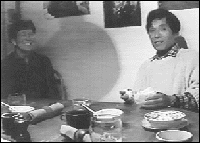|
|
| Director: Sushma Joshi Source: Sushma Joshi c/o PR Joshi PO Box 140, Kathmandu NEPAL e-mail: sushma@mos.com.np NEPAL / 1996 / English, Nepali / Color / Video / 60 min |
Grew up in Nepal. When she was nineteen, she went on to the US to do her undergraduate studies at Brown University. She majored in International Relations, which led her to be especially interested in questions of communication between different cultures and the power of representations. This interest in cultural issues and ethnography led her to take classes in anthropology and documentary. The Sound of Silence came out of these different interests. She is at present working in Kathmandu, doing freelance journalism and web work, learning the tabla and living in an old, old house in the middle of Patan, an area that started out as a mediaeval town of the Kathmandu Valley. She hopes to be able to do more work in video and perhaps also CD-ROMs in the future. |
 |
|
| In this video, layers of discommunication between a well-meaning American couple and a visiting Sherpa man, compounded with the dilemma of the Nepalese filmmaker who is caught in between as interpreter, prompt the viewer to review the limits to language and communication. Innocent discussions about food and culture reveal much about relative positions, through statements that could only be made through untranslated remarks and silences. | |
|
|
|
|
Director's Statement The Sound of Silence came out of production classes in the Modern Culture and Media department at Brown university. This is about the communication/miscommunication between a Sherpa man and his host family who brought him over to the US, so that his adopted daughter, who was deaf, could go to school. I was interested in examining issues of subjectivity/objectivity, representations and the question of "truth" rather than in making purely journalistic works.This has led me to edit in an experimental style that can seem disorienting to audiences used to a linear narrative. I was trying, with my editing, to catch situations where the ambiguities and contradictions of everyday life blurred into how people perceived and represented themselves on camera. I was also interested in trying to use the video that I had caught to think about larger issues of structural inequality, privilege and power, and in interrogating my own position as translator and mediator. |
|